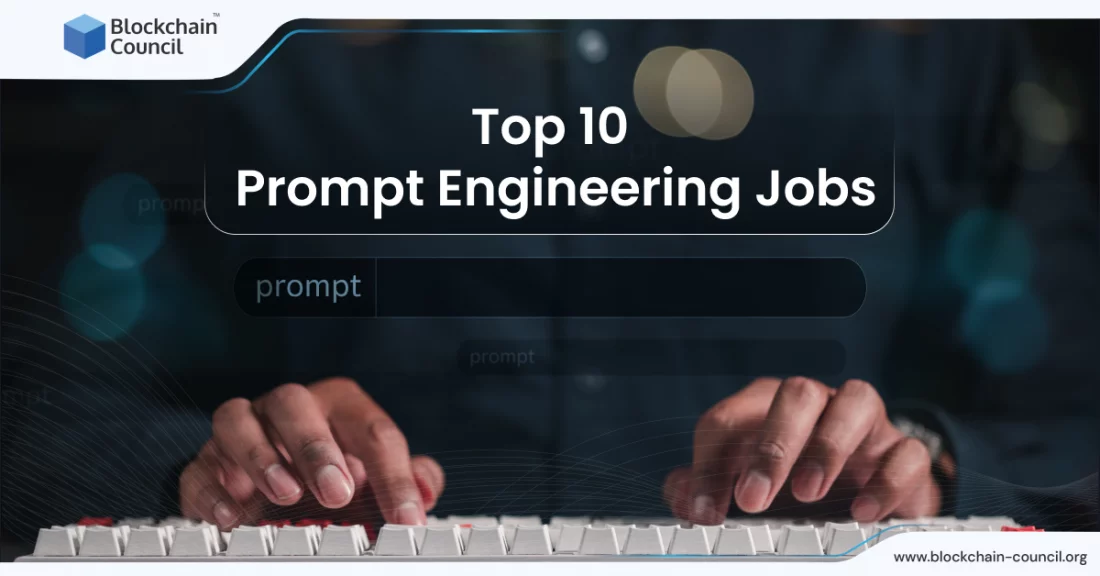
- Blockchain Council
- January 17, 2025
The landscape of AI and prompt engineering has evolved into a critical component of the technology sector, marked by significant advancements in AI capabilities and their applications. Prompt engineering, particularly, has become essential for creating sophisticated AI-powered services and extracting more refined results from generative AI tools. The ability of prompt engineers to fine-tune large language models (LLMs) and troubleshoot specific workflows has been pivotal in advancing AI technology, thereby creating better AI. This is why there is a rise in AI prompt engineer jobs.
The importance of prompt engineering in the current tech industry cannot be understated. It plays a crucial role in enabling AI models to generate relevant outputs based on user inputs, which is fundamental in a data-driven world where accuracy and efficiency are paramount. As AI continues to grow, the demand for prompt engineers who can provide high-quality input data to models is increasing, especially in situations where data may be scarce or particularly complex.
The job market reflects this trend, with AI and machine learning specialists, including prompt engineers, becoming some of the world’s fastest-growing professions as reported by the World Economic Forum’s Future of Jobs Report 2023. This growth is partly due to the role of prompt engineering in enhancing real-time data processing and managing the vast amounts of data produced by an array of digital devices and platforms.
The significance of prompt engineering extends beyond just the tech industry; it is reshaping how AI solutions are developed and implemented across various sectors. As we delve further into the era of AI, the nuanced skills of prompt engineers will continue to be in high demand, shaping the future and the impact of AI applications across the board. In this article, we will discover the top 10 AI prompt engineering jobs and what skills you need to grab them.
What is AI Prompt Engineering?
AI prompt engineering is an innovative field in artificial intelligence that focuses on the development and refinement of prompts to elicit specific responses from AI systems, particularly generative language models like ChatGPT and image generators like DALL-E. A prompt in this context is essentially a set of instructions or inputs given to an AI model to guide its output generation. This process is not only about the creation of prompts but also involves the intricate understanding of how AI models interpret these prompts to produce relevant and high-quality results.
The role of a prompt engineer, therefore, is to craft these input prompts in a way that optimizes the AI’s performance, ensuring that the output aligns with human expectations and needs. By using precise language, verbs, and vocabulary, AI prompt engineers can push the boundaries of what AI can achieve, discovering new potential applications and ironing out any idiosyncrasies in the AI’s responses.
The evolution of prompt engineering jobs reflects the broader development of AI and machine learning. As AI models have become more sophisticated, the need for prompt engineering has grown. The technology’s reliance on large datasets for training means that the prompts used during this process can significantly influence the quality of the AI’s subsequent performance and outputs. The craft of AI prompt engineering ensures that AI systems can more effectively mimic human-like responses and interactions, marking a significant step in AI development.
Top 10 Prompt Engineering Jobs
AI Chatbot Developer
AI Chatbot Developers are at the vanguard of conversational AI, a field burgeoning with a predicted market growth to USD 18.4 billion by 2026. They harness technologies like artificial intelligence, natural language processing (NLP), and machine learning to craft sophisticated virtual assistants. These developers play a pivotal role in understanding user intent, refining the conversational experience, and integrating chatbots across diverse digital platforms.
Their impact is profound across multiple sectors. In e-commerce, chatbots streamline shopping experiences by assisting customers in product searches and purchases. Healthcare bots provide information on symptoms and guide through preliminary diagnosis steps, while real estate chatbots assist in property searches and initial customer interactions.
Key Responsibilities:
- Design, develop, test, deploy, and maintain AI-powered chatbots.
- Utilize AI, NLP, and machine learning technologies to enhance conversational interfaces.
- Integrate chatbots across multiple communication channels.
- Analyze and interpret user data to improve chatbot functionality.
- Collaborate with cross-functional teams to align chatbot objectives with business goals.
Skills Required:
- Proficiency in AI, NLP, and machine learning frameworks.
- Experience with chatbot development platforms like Google DialogFlow or IBM Watson.
- Strong programming skills in languages such as Python, Java, or PHP.
- Knowledge of front-end technologies for bot integration.
- Ability to analyze large data sets and apply insights to improve user experience.
Content Creation Specialist
Content Creation Specialists are the architects of digital narratives, shaping how brands communicate with their target audience. They craft compelling content that boosts SEO, enhances user engagement, and strengthens brand reputation. Their expertise spans various forms of media, including blog posts, social media updates, videos, and podcasts.
Their work is pivotal in ensuring content is not only engaging and informative but also optimized for search engines to improve visibility and ranking. By leveraging keyword research, these specialists ensure that the content resonates with the audience’s search intent, aligning with the latest SEO practices.
The role requires a blend of creativity and analytical skills, as specialists must measure content performance and use insights to drive content strategy. A comprehensive understanding of content management systems, analytics tools, and the digital marketing landscape is essential.
Key Responsibilities:
- Produce high-quality, engaging content across various formats, including video, blogs, and social media.
- Manage content within content management systems (CMS).
- Collaborate with teams to optimize content for SEO and user experience.
- Develop and implement overarching content strategies.
- Maintain brand voice and adhere to content standards and compliance.
Skills Required:
- Experience in creating diverse content formats.
- Understanding of SEO principles and social media strategies.
- Strong attention to detail and ability to work under pressure.
- Proven ability to meet deadlines and go above and beyond in content creation.
AI-Powered Educational Platform Developer
AI-Powered Educational Platform Developers are reshaping the educational paradigm. They build systems that facilitate adaptive learning environments, catering to individual learning preferences and pacing. These platforms utilize data-driven insights to customize educational content, providing students with a tailored learning journey that can lead to improved comprehension and retention.
Developers in this field need to be well-versed in educational theories and pedagogical approaches, combining them with AI to create interactive and responsive learning experiences. Their work supports educators by providing rich data on student performance, identifying areas where learners struggle, and offering targeted interventions.
Key Responsibilities:
- Design and develop adaptive learning platforms that personalize the educational experience for students.
- Implement AI algorithms to analyze student performance data and customize the learning material.
- Collaborate with educators to incorporate AI tools that assist in administrative tasks and student assessments.
- Stay abreast of the latest AI advancements and apply these to educational content to make it more interactive and engaging.
- Address ethical considerations related to AI in education, such as data privacy and algorithm bias.
Skills Required:
- Proficiency in AI, machine learning algorithms, and data analytics to create personalized learning experiences.
- Strong programming skills, particularly in languages used in AI development, such as Python.
- Knowledge of educational theories and the ability to incorporate these into platform designs.
- Experience in developing and maintaining scalable and secure online platforms.
- Commitment to addressing ethical issues in AI, ensuring equitable and inclusive access to educational resources.
Legal AI Tool Developer
Legal AI Tool Developers are transforming the legal industry by automating tasks such as document analysis, case law research, and contract review. Their tools help legal professionals work more efficiently, with greater accuracy, and with access to deeper insights from legal data.
These developers combine their knowledge of the legal domain with technical acumen in AI to develop tools that can parse legal language, extract relevant information, and predict legal outcomes. They are critical in creating platforms that enhance decision-making and streamline workflows in legal practices.
Key Responsibilities:
- Develop AI tools that automate and enhance various legal processes, such as document analysis, case prediction, and legal research.
- Work with legal professionals to understand their needs and translate these into technical requirements.
- Ensure the AI tools comply with legal standards and maintain data privacy and security.
- Keep up-to-date with the latest legal technology trends and integrate new features to improve tool performance.
Skills Required:
- Expertise in NLP and text analysis algorithms to process legal documents.
- Strong background in software development, with a focus on secure, compliant, and user-friendly design.
- Understanding of the legal industry and the specific challenges faced by legal professionals.
- Ability to navigate ethical considerations in legal AI, such as bias prevention and transparency in AI decision-making.
AI-Assisted Healthcare Diagnostician
AI-assisted healthcare diagnosticians are at the forefront of leveraging artificial intelligence to transform patient care. By 2025, this role will have become even more pivotal, as AI continues to aid in diagnosing diseases, managing chronic conditions, and personalizing treatment plans. These specialists utilize AI algorithms to analyze medical images, patient data, and genomics to deliver faster and more accurate diagnoses. The advancement in AI-driven healthcare is not only improving the quality of life but is also aiding in the early detection of ailments, thus potentially saving lives.
Key Responsibilities:
- Develop AI models for analyzing medical images and diagnostic data
- Collaborate with healthcare professionals to integrate AI tools into clinical workflows
- Stay current with medical research to improve diagnostic AI algorithms
- Ensure the accuracy and privacy of patient data used in AI diagnostics
Skills Required:
- Proficiency in machine learning algorithms and AI frameworks.
- Strong understanding of bioinformatics and healthcare data systems.
- Knowledge of regulatory standards and compliance in healthcare.
- Ability to interpret complex medical data and provide actionable insights.
Marketing Campaign Engineer
The role of the marketing campaign engineer is evolving with the integration of AI and machine learning into marketing strategies. By 2025, such professionals will be instrumental in analyzing consumer behavior and tailoring campaigns to deliver personalized marketing at scale. The incorporation of AI in customer relationship management systems has revolutionized how businesses interact with customers, offering significant enhancements in engagement, efficiency, and cost management. Influencer collaborations and interactive content will remain key strategies for engaging audiences, while optimizing for voice search and emphasizing sustainability will be critical for aligning with consumer trends and preferences.
Key Responsibilities:
- Design and implement AI-driven marketing strategies
- Analyze customer data to identify trends and tailor marketing efforts
- Oversee the automation of marketing processes
- Collaborate with sustainability experts to integrate eco-friendly practices into campaigns.
Skills Required:
- Expertise in AI and machine learning, especially in predictive analytics.
- Strong analytical skills and proficiency in data analysis tools
- Creativity in developing targeted marketing campaigns
- Knowledge of digital marketing platforms and SEO
NLP Specialist
Natural Language Processing (NLP) specialists will be essential in managing the growing volume of unstructured textual data from social media, customer feedback, and other digital communications. By 2025, the demand for NLP experts will likely have surged due to their ability to develop algorithms that extract insights and patterns from large datasets. Their expertise will continue to refine the capabilities of chatbots and virtual assistants, contributing to enhanced customer service and more intuitive user experiences. Multilingual NLP models will also be in demand as businesses seek to expand their global reach.
Key Responsibilities:
- Develop and refine NLP algorithms for various AI applications
- Work on language translation models and sentiment analysis tools
- Enhance the performance of chatbots and virtual assistants
- Stay abreast of advancements in NLP and apply them to ongoing projects
Skills Required:
- Deep understanding of NLP and its applications in AI
- Expertise in linguistics and language modeling
- Proficiency in programming languages used in AI, such as Python
- Experience with machine learning frameworks and text analytics
Data Analytics Expert
Data analytics experts will play a critical role in data-driven decision-making. Their expertise in AI and machine learning will be vital in predictive modeling, automation, and enhancing various industries including finance, marketing, and healthcare. Ethics and governance professionals within this domain will ensure that data practices comply with regulations and ethical standards. The integration of IoT with data analytics will lead to advancements in real-time decision-making, predictive maintenance, and personalized customer experiences. Data visualization and storytelling experts will continue to turn complex data into comprehensible and engaging narratives, enabling stakeholders to make informed decisions quickly.
Key Responsibilities:
- Analyze large datasets to uncover trends and provide insights
- Ensure that data analytics practices adhere to ethical standards and legal requirements
- Develop predictive models for various industry applications
- Create compelling data visualizations to tell stories and inform decision-making
Skills Required:
- Strong background in statistics and data modeling
- Proficiency in big data technologies and data mining
- Expertise in data visualization tools and techniques
- Knowledge of IoT technology and its integration with analytics
AI Model Optimizer
In the landscape of AI, the role of an AI Model Optimizer is pivotal. As we harness the potential of edge AI, optimizing machine learning models for small devices becomes crucial. This expertise not only enhances the resilience and robustness of AI applications, such as autonomous technology, but also ensures efficient use of computational resources.
AI Model Optimizers are at the forefront of innovation, enabling more complex models to run on less hardware. This optimization is essential for reducing memory footprints and computational costs, thereby maximizing the utility of ML models. Companies like Ford Motor Company have emphasized the need for such roles, as they design models to be optimized for edge devices. Looking forward, the demand for professionals who can ensure robustness and control in AI models is only set to grow.
Key Responsibilities:
- Developing and implementing algorithms to optimize the performance of AI models.
- Ensuring AI solutions meet specific criteria and are robust and effective.
- Balancing the trade-offs between model complexity and system performance.
- Collaborating with hardware teams to optimize AI models for specific hardware architectures.
Skills Required:
- Proficiency in programming languages like Python, Java, C++, Julia, R, and Scala.
- Deep understanding of machine learning algorithms, deep learning, and neural networks.
- Knowledge of data engineering and big data analytics.
- Mathematical skills, especially in areas like linear algebra, calculus, statistics, and probability.
- Competence in AI tools and libraries such as TensorFlow, PyTorch, Keras, scikit-learn, and Tableau.
User Experience Designer for AI Systems
User Experience Designers specializing in AI systems play a critical role in shaping how we interact with AI technologies. They advocate for the user, ensuring AI applications are grounded in human-centric design principles. This involves conducting user research to avoid bias, defining high-quality training data, and ensuring transparency and control for users, which is paramount for gaining user trust.
AI tools also automate routine tasks, freeing designers to focus on more strategic design challenges. For instance, AI can resize images, suggest color palettes, and even draft preliminary user personas, which are crucial for the early stages of design. Moreover, AI’s ability to identify behavior patterns and predict user preferences helps in crafting more user-centric designs.
Key Responsibilities:
- Designing intuitive and personalized AI-based user interfaces.
- Incorporating user feedback and behavior analysis to refine AI systems.
- Ensuring that AI design elements such as mood boards and icons align with the desired user experience.
Skills Required:
- The ability to enhance creativity and personalization in AI interfaces.
- Skills to automate everyday tasks and identify behavior patterns through AI.
- Expertise in creating user personas and conducting competitor research using AI tools.
Educational Pathways and Certifications
In the burgeoning field of prompt engineering, educational pathways and certifications form the backbone of a successful career. As we navigate towards 2025, it’s evident that a blend of academic knowledge and certified expertise will be key differentiators in the job market.
Degrees and Formal Education
A formal degree in computer science, information technology, or related fields is typically the starting point for aspiring prompt engineers. Such programs cover a wide array of foundational topics, including but not limited to, programming languages, algorithms, data structures, and system architectures. This academic groundwork is critical as it provides prompt engineers with the theoretical underpinnings needed to understand and manipulate complex AI systems.
However, the fast-paced nature of technology means that theory alone isn’t enough. Real-world application of these principles is what truly prepares prompt engineers for the challenges they will face in the workforce. As such, educational institutions often encourage or require participation in internships, co-op programs, or capstone projects, which offer invaluable hands-on experience and a chance to engage with real-world problems and technologies.
AI Certifications
Certifications play a pivotal role in complementing formal education. They act as a testament to a professional’s skills and are often recognized by employers as a benchmark of expertise. Certifications can be particularly useful for staying current in an ever-evolving field and may focus on specific skills or technologies that are in high demand.
For prompt engineers, certifications from entities like the Blockchain Council serve as a beacon of proficiency in AI and Blockchain technology. The Blockchain Council offers AI certifications that are meticulously crafted to meet the industry’s needs, ensuring that certified individuals are not only up-to-date with current best practices but also equipped with knowledge about emerging trends and technologies.
It’s important for certifications and learning paths to be presented in a way that is informative and genuinely useful for career advancement, rather than appearing overly promotional. The Blockchain Council’s AI certifications, for instance the Certified Prompt Engineer™ certification, offer a comprehensive curriculum that can significantly bolster a prompt engineer’s qualifications. Coupled with a self-paced, online, practical learning approach, these AI certifications by the Blockchain Council can enhance a candidate’s skill set and employability in this competitive field.
Continued Education and Lifelong Learning:
The learning journey doesn’t end with a degree or certification. Prompt engineering is a discipline that benefits greatly from continual learning. Professionals are encouraged to stay abreast of new developments in AI, ML, and NLP through ongoing education—whether that be through advanced degrees, professional development courses, or industry certifications. As the field evolves, so too must the knowledge and skills of those who work within it.
Current Status and Future Trends of Prompt Engineer Jobs
- AI’s Transformative Role: AI’s influence extends far beyond automation. Developments such as OpenAI’s Project Q underscore the push towards artificial general intelligence (AGI). This transformative role affects how various industries approach work, creativity, and innovation, setting the stage for the next era of job roles.
- Augmented Working: A significant trend in the AI landscape is the evolution of AI from a mere tool to an indispensable collaborator in professional roles. Augmented Working integrates AI into the core of job functions, enhancing human capabilities and decision-making. Professionals like surgeons, attorneys, remote workers, and online educators leverage AI to achieve improved efficiency and effectiveness.
- Generative AI (GenAI): A noteworthy advancement in AI is Generative AI (GenAI), capable of creating new and unique content across various mediums—text, images, music, and code. Leveraging deep learning techniques like Generative Adversarial Networks (GANs) and Variational Autoencoders (VAEs), GenAI’s applications span diverse sectors such as entertainment and healthcare, revolutionizing creative processes and offering innovative solutions.
- Job Market Shifts: The demand for workers skilled in AI and GenAI is on the rise, leading to transformative shifts in job roles across industries. GenAI tools are increasingly integrated into various sectors, boosting productivity and necessitating a transformation in job roles. The mention of ‘GenAI’ in job listings reflects a growing demand for professionals adept in these advanced technologies.
- Sector-Specific Impacts: Projections indicate that by 2030, up to 30% of hours currently worked across the US economy could be automated. The impact is expected to be profound in sectors like office support, customer service, and food service. Conversely, sectors such as healthcare, STEM, and transportation services are poised for job growth.
- Occupational Transitions: Anticipating the seismic shifts due to automation, an estimated 12 million additional occupational transitions may be required by 2030. Workers in lower-wage jobs are particularly likely to face significant transitions, necessitating the acquisition of new skills and emphasizing the need for workforce development and training.
- Impact on Job Categories: While Generative AI is set to significantly alter the mix of work activities, particularly for knowledge workers, it is not expected to lead to outright job elimination. The future foresees substantial job gains in healthcare and STEM fields, juxtaposed with potential losses in office support, customer service, and food services.
Future Outlook of Prompt Engineering Jobs
As the calendar approaches 2025, AI prompt engineering jobs emerge as a dynamic and integral component of the AI landscape. What was once a nascent field has now burgeoned with opportunities, with AI models like GPT-3 and GPT-4 showcasing unprecedented capabilities in understanding and generating human-like text.
- Specialized Roles: The year 2025 witnesses a notable surge in demand for AI Prompt Engineers—professionals pivotal in fine-tuning AI systems to comprehend and execute human prompts effectively. These specialized roles play a crucial part in translating AI capabilities into tangible, real-world applications.
- Diverse Employment Landscape: From full-time positions to freelance and contract opportunities, the employment landscape for AI prompt engineers is both rich and varied. Professionals have the chance to specialize in large language models (LLMs) like ChatGPT or Bard, catering to a broad spectrum of applications within the domain.
Emerging Trends and Future Prospects in the Field
The AI prompt engineer jobs domain is experiencing a dynamic surge in specialized roles, offering diverse opportunities for professionals.
- Convergence with Other Technologies: The evolution of AI, including prompt engineering, is not in isolation. It converges with other technological advancements such as machine learning, collaborative robotics, digital twins, cybersecurity, 3D printing, the Internet of Things (IoT), and advanced programming. This convergence is poised to redefine the engineering paradigm, ushering in an era of innovation and new trends that will inevitably shape the job roles of the future.
- Remote Work Opportunities: A notable trend in talent acquisition for AI-related roles is the proliferation of remote work opportunities. The flexibility and accessibility of remote working arrangements have become a mainstay in the prompt engineering sector, attracting a global talent pool and changing the traditional workspace dynamics.
Conclusion
The year 2025 presents a promising landscape for individuals aspiring to excel in prompt engineering. As technology continues to advance, the demand for skilled prompt engineers is expected to soar. The AI prompt engineer job roles highlighted in this article represent just a glimpse of the diverse and exciting opportunities available. Whether it’s crafting powerful prompts for virtual assistants, optimizing search algorithms, or enhancing user experiences, prompt engineering professionals will play a pivotal role in shaping the future of AI and language processing. Stay informed, acquire the necessary skills, AI certifications by the Blockchain Council and embark on a rewarding career in the dynamic world of prompt engineering.
Frequently Asked Questions
Can a non-IT person learn prompt engineering?
- Yes, it is possible for a non-IT person to learn prompt engineering.
- Consider enrolling in the Certified Prompt Engineer™ Certification Program offered by the Blockchain Council.
- The certification program is designed to boost tech and AI career trajectories.
- It doesn’t require any prior technical skills, making it accessible for individuals with diverse backgrounds.
- The program focuses on the craft of generating prompts for large language models, producing precise and contextually relevant responses.
- Practical experience gained through this certification can help non-IT individuals develop proficiency in prompt engineering.
What does a Prompt Engineer do?
- Craft input prompts for AI systems like ChatGPT to optimize performance.
- Develop and refine prompts to elicit specific responses from generative AI models.
- Ensure AI outputs align with human expectations and needs.
- Use precise language, verbs, and vocabulary to fine-tune large language models.
- Play a pivotal role in advancing AI technology and creating sophisticated AI-powered services.
Is prompt engineering in demand?
- Yes, prompt engineering is in high demand.
- The job market for prompt engineers is growing rapidly.
- AI and machine learning specialists, including prompt engineers, are among the fastest-growing professions.
- The demand is driven by the need for refined results from generative AI tools and creating better AI-powered services.
Is being a prompt engineer hard?
- The difficulty depends on individual skills and background.
- Requires a strong understanding of AI, machine learning, and large language models.
- Involves crafting precise input prompts and optimizing AI performance.
- Continuous learning is crucial due to the fast-paced nature of technology.





































































 Guides
Guides News
News Blockchain
Blockchain Cryptocurrency
& Digital Assets
Cryptocurrency
& Digital Assets Web3
Web3 Metaverse & NFTs
Metaverse & NFTs
